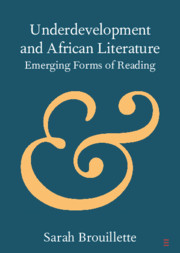Element contents
Underdevelopment and African Literature
Published online by Cambridge University Press: 23 December 2020
Summary
- Type
- Element
- Information
- Online ISBN: 9781108624947Publisher: Cambridge University PressPrint publication: 28 January 2021
References
- 5
- Cited by

